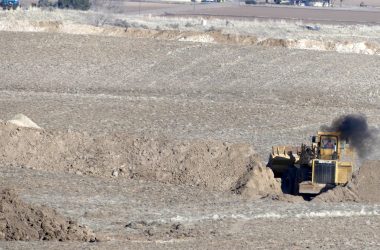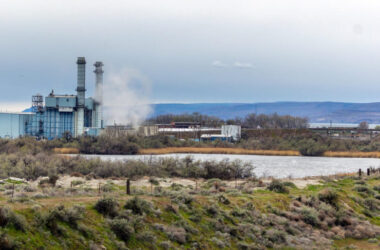
NYSSA – Jim Maret was doing a little repair work on his house Friday when he paused to reflect on prospects of a new rail reload center north of town.
The project – which gained approval from the Oregon Transportation Commission July 18 – is one Maret has worked on for the past year.
The decision by the commission to support the $26 million project means Nyssa will get a big economic shot in the arm, said Maret.
“It is huge for us – a game-changer for Nyssa,” said Maret.
The commission approved the reload center on a 5-0 vote, nearly two years after Malheur County began to plan the venture.
At the rail reload center, onion producers will truck their onions to Nyssa where they will be loaded onto rail cars for shipments back east.
Under the plan, which was significantly modified from the original concept, the county will go into the rail car business, leasing up to 200 rail cars.
The county has proposed a 60,000-square foot warehouse at the site proposed for the shipping center, acreage along the Union Pacific north of downtown Nyssa.
A key to the project was solving a long-standing challenge that onion producers had in getting rail cars and then reliable service from Union Pacific.
The industry and county officials had hoped to replicate the fast delivery service in Wallula, Wash., now used to ship some of Malheur County’s onions, reaching markets days faster than traditional rail service.
That faster service isn’t part of the plan for now, but stabilizing the supply of cars and insuring steady service were seen as key reasons to push the project ahead.
The state money was set aside two years ago in a massive transportation plan approved by the Legislature.
The allocation was engineered by state Sen. Cliff Bentz, R-Ontario.
The commission’s approval last week, months later than expected, doesn’t mean the county gets a state check right away to get construction underway.
The next step for the Malheur County Development Corp., the public company established by the Malheur County to oversee the project, will be to ink an agreement with the state Transportation Department on the fine details.
Those fine details include construction and other project deadlines. Then the transportation commission must approve the agreement. Exactly when the county will clear those steps remains unclear.
The $26 million in taxpayer funds will be parceled out to the county, said Erik Havig, transportation department planning section manager. Initial funds, he said, will be to “get to certain milestones, not to buy property or start construction.”
“They won’t be out there with a shovel breaking ground next week,” said Havig.
The county has two pieces of property under real estate agreements for the center, including a $3 million deal for property north of Nyssa categorized as the base site for the project.
Havig emphasized the transportation commission will use “key milestones and check-in points to take an incremental approach,” to the project.
Grant Kitamura, an onion industry leader and president of the Malheur Economic Development Corp., said he is just fine with the state’s approach.
“It will be a stair step, and I understand completely. But we are pleased and we are ready to move forward,” said Kitamura. Kitamura is a managing partner at Baker & Murakami Produce in Ontario.
The decision by the commission was a spectacular turnaround from June when it indicated the local project was on life support.
The decision by the commission hinged on new information delivered by the county to the state two weeks ago. That information was evaluated by the Tioga Group, a Pennsylvania consulting firm hired by the state last year.
The Tioga Group said in findings released, just one day before the commission session, that the Nyssa project “has a reasonable chance of operational and economic viability.”
The new information showed onion shippers will save up to $2 a bag of onions shipped compared to using the high-speed shipping service based in Wallula, Wash.
The consultants said the county now projects more rail car shipments will flow from Malheur County than originally projected – 2,000 rather than the initial estimate of 1,853 – and nine local producers who were not identified pledged to use the facility.
The Tioga Group also showed that area producers will reap close to $10 million in savings annually from the center – five times what economists projected. The Tioga Group said it couldn’t independently verify the information provided by the county.
“It will create a robust economy for us because you will have businesses and housing and that is a good thing,” said Maret.
Kitamura said the rail reload facility will create a “ripple effect” on the local economy.
“This facility will allow us to have additional modes of transportation and keep our (onion) industry here viable. Thus, we will be able to sustain our farms. It has a lot of potential to help this valley. There is nothing negative with this,” said Kitamura.
State Rep. Lynn Findley (R-Vale) said the decision by the commission is a “huge deal.”
Findley, who is also a member of the Malheur Economic Development Corp., said the facility will “open up markets” and solve a lingering challenge with transportation for onion producers.
“Every shipper for the past couple of years has talked about the shortage of trucks and escalating costs of transportation,” said Findley. Greg Smith, Malheur County economic development director, was not available for comment last week.
Reporter Pat Caldwell: [email protected] or 541-47-3377.
SUBSCRIBE TO HELP PRODUCE VITAL REPORTING — For $5 a month, you get breaking news alerts, emailed newsletters and around-the-clock access to our stories. We depend on subscribers to pay for in-depth, accurate news produced by a professional and highly trained staff. Help us grow and get better with your subscription. Sign up HERE.




